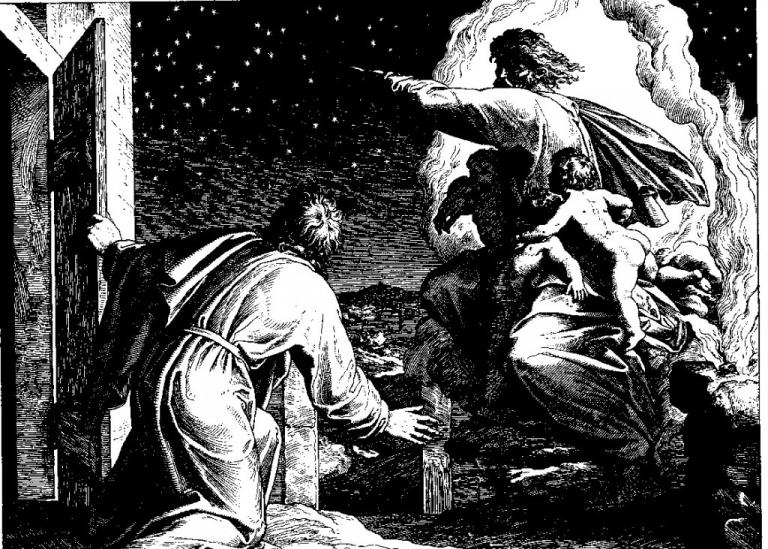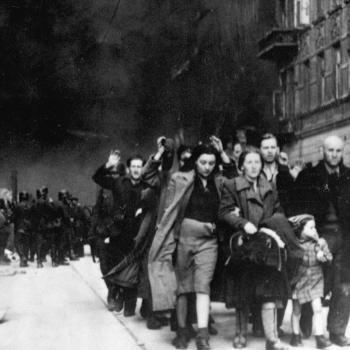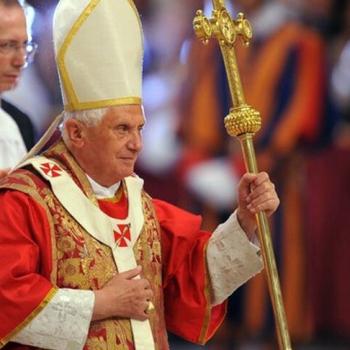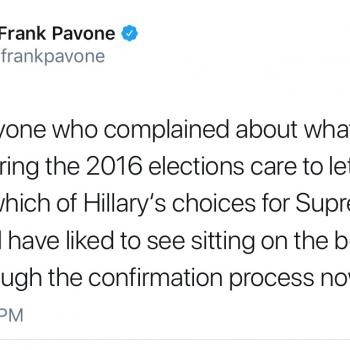
“And he brought him forth abroad, and said, Look now toward heaven, and tell the stars, if thou be able to number them: and he said unto him, So shall thy seed be” (Julius Schnorr von Carolsfeld)
This is not, or need not be, complicated: Catholics, Protestants, the Eastern Orthodox, Jews, and Muslims all worship the same god. The difference is in what they believe about him. But regardless of what they believe about him, the god they worship is the god of Abraham. Dr. Shabir Ally (he’s a Muslim scholar and apologist) does not worship some different divine figure than Pope Francis does.
Now, the Church affirms all this in Nostra Aetate.
The Church regards with esteem also the Moslems. They adore the one God, living and subsisting in Himself; merciful and all-powerful, the Creator of heaven and earth, who has spoken to men; they take pains to submit wholeheartedly to even His inscrutable decrees, just as Abraham, with whom the faith of Islam takes pleasure in linking itself, submitted to God. Though they do not acknowledge Jesus as God, they revere Him as a prophet. They also honor Mary, His virgin Mother; at times they even call on her with devotion. In addition, they await the day of judgment when God will render their deserts to all those who have been raised up from the dead. Finally, they value the moral life and worship God especially through prayer, almsgiving and fasting.
Lumen Gentium 16 says the same.
[T]he plan of salvation also includes those who acknowledge the Creator. In the first place amongst these there are the Muslims, who, professing to hold the faith of Abraham, along with us adore the one and merciful God, who on the last day will judge mankind.
In §841, the Catechism repeats these words from Lumen Gentium.
Pope St. John Paul II affirmed the same truth in a speech on May 9, 1985.
As I have often said in other meetings with Muslims, your God and ours is one and the same, and we are brothers and sisters in the faith of Abraham.
Pope Benedict XVI also affirmed this teaching in his apostolic exhortation Ecclesia in Medio Oriente. The connection between Christians, Jews, and Muslims, the pope said, is
grounded in the sacred Scriptures and [is] clearly defined in the Dogmatic Constitution on the Church Lumen Gentium and in the Declaration on the Church’s Relation to Non-Christian Religions Nostra Aetate. Jews, Christians and Muslims alike believe in one God, the Creator of all men and women.
The USCCB quotes a number of similar statements.
That Catholics and Muslims worship the same divine figure, the god of Abraham—independent of what they believe about him—is simply a fact. I can’t imagine what point there is in denying it. I am glad the Church has affirmed it, although she no more needs to than she needs to affirm that two and two make four.
***
Nonetheless, as I peer across the intertubes to LifeSiteNews and Crisis Magazine, I find denial of fact.
I find LSN promoting an interview with Cardinal Burke in which Burke says it is “highly questionable” that Christians and Muslims worship the same god.
Is that so? Have Muslims stopped worshipping the god of Abraham? Are they worshipping someone else now, possibly Mithras, or Shiva, or Ahura Mazda? Do they worship Baal? Zeus? Woden? Isis and Osiris? Ra? Does anyone know how to contact Dr. Shabir Ally and ask him? Are Muslims still worshipping the god of Abraham, Dr. Ally? I just want to confirm this.
Nostra Aetate, says Burke, “is not a dogmatic document.”
Well, I guess that’s that, then. Burka locuta est.
The only problem is, I don’t have to believe that NA is “dogmatic” in order to believe that is authoritative, or that its reference to Islam as an Abrahamic faith is a simple point of fact.
One may say that Nostra Aetate is not “dogmatic,” but that’s a distinction without a difference, and only serves to confuse the issue. (And the faithful.) As a result many will think they are right to reject Vatican II, or the authority of the Church. That is true whether Burke intended such a result or not.
Oh, I need not pay attention to that. It’s not dogmatic.
The Profession of Faith tells us otherwise.
I adhere with religious submission of will and intellect to the teachings which either the Roman Pontiff or the College of Bishops enunciate when they exercise their authentic Magisterium, even if they do not intend to proclaim these teachings by a definitive act [cf. Canon 752, CCC 892].
I have quoted that text before. I quote it now. It is not unlikely I will quote it again.
You can’t just make the claim that Nostra Aetate is not part of the “authentic Magisterium” of the Church. It’s a conciliar document . Conciliar documents are magisterial; interviews with prelates are not, not even prelates beloved of Life Site News. Whether NA is “dogmatic” or not is beside the point; no one is free to just wave his hand and disregard it. And it is certainly madness to do so in reference to a mere point of fact.
Burke, however, claims he knows why Muslims and Christians worship two different gods. “The council,” said one questioner, “is pretty clear that we and Muslims do worship the same God.” Burke said:
It’s one thing to say that, but to say that we worship the same God as stated in Nostra Aetate, which is not a dogmatic document, I think is highly questionable.
How can the God that we know, a God fundamentally of love, St. John says “God is love,” be the same God that commands and demands of Muslims to slaughter infidels and to establish their rule by violence?
But I think one has to look at those documents in terms of, I believe what’s most important for us today is to understand Islam from its own documents and not to presume that we know already what we’re talking about.
Okay. Well, I don’t know anyone who claims that Christians and Muslims agree about what God “commands.” That’s different from whether or not they worship the same divine figure. Burke is attacking a straw man. I may go to my priest for spiritual direction, and my priest and I may disagree with each other about what God is asking of me; this does not mean my priest worships a different god than I do. No one would claim any such thing.
A second point. In the Old Testament, God constantly tells the Hebrews to slaughter unbelieving nations and acquire the Promised Land by violence. Do Christians worship a different god than the Hebrews? It’s fair to ask.
Now, I wholly agree that we need to look at Islam’s own documents to figure out what they believe and who they worship. That is good advice. And if some Islamic text says that Muslims worship some different god than the Christian god—Quetzalcoatl?—I would sure like to be shown where I can find it. Paging Dr. Ally.
***
Then I find Crisis publishing an article by Fr. Brandon O’Brien with the title “Why Christians and Muslims Worship Different Gods.”
(You know, if someone knows how to put me in touch with Shabir Ally, I really have some questions for the gentleman. All this time I’ve been under the impression that he worships the god of Abraham just like I do. But perhaps he needs to correct me on this point.)
Fr. O’Brien, after spilling a lot of ink telling us why good Catholics ought to reject the dubious “circular reasoning” in Nostra Aetate and Lumen Gentium, gives six reasons why he thinks Muslims worship some divine figure other than Yahweh.
- Muslims do not believe God is our father in heaven.
- Muslims do not believe Christ is divine.
- Muslims do not portray Mary the same as Catholics.
- Muslims do not believe in the Trinity.
- Muslims do not believe Christ was crucified.
- Muslims do not believe the Bible we have is the original text transmitted by God.
Straw men all. No one I know claims that Muslims believe in the divinity of Christ. No one says Muslims believe in the Trinity. Do you know anyone who does? Point me in his direction, I pray you.
I do not think there is anyone—at least, no informed person— who says (1) that Muslims agree with Christians about the nature of God; (2) that Muslims agree with Christians about the facts of Jesus’s life, or Mary’s; (3) that Muslims agree with Christians about the infallibility of Sacred Scripture.
These, dear reader, are entirely separate questions from the one Fr. O’Brien is ostensibly refuting.
(And truth be told, I had to laugh when Fr. O’Brien said Muslims believe “that the Bible of today is not the original one that was transmitted by God.” Does Catholicism teach something different? Of course it’s not the original one. Ask any biblical scholar you like; there is not one who will tell you that we have the original manuscript of the Bible. The notion that we do is silly. Not only that, but the manuscripts we do have contain, oh, a variant or two.
Where Muslims differ from Christians (at least, orthodox ones) is, Muslims claim that because the extant manuscripts are not originals, they are unreliable. But absolutely no one, who knows what he is talking about, disputes that this difference of opinion exists. What any of that has to do with what god Muslims worship, I confess I haven’t a clue. But if someone wants to put me in touch with Shabir Ally, and he wants to tell me that Muslims are no longer worshipping Yahweh—the selfsame divine figure they call “Allah”—I will concede the point.)












